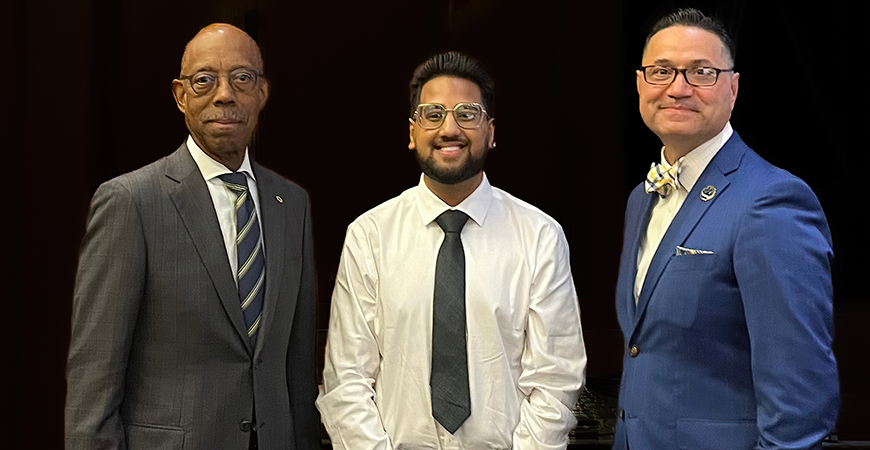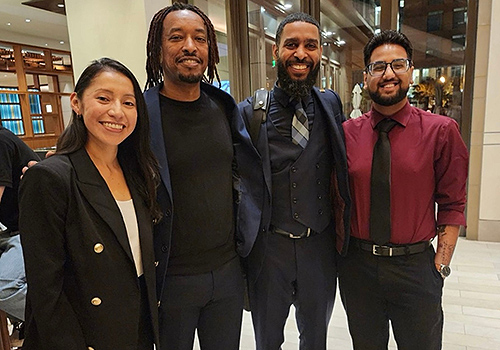
First-generation doctoral student Josiah Beharry made history in 2023 when he was chosen as the first student regent from UC Merced.
In addition to being the 50th student to serve on the Board of Regents that governs the University of California system, Beharry also is the first publicly identified undocumented DACA student to be named.
Born in Trinidad, he immigrated to the U.S. with his family at age 3 and was raised in Ventura.
“I think being an undocumented and DACA recipient student helps me give insight to the board. There are a lot of conversations about what undocumented students bring to this country in general. How much we give in our service, our time and our taxes, and what we get back” he said. “I've helped by telling them my experience and sharing the ways that UC can help support our dreams and our future especially at a time when we are under a microscope and fighting to prove our worth amid a system that often questions our belonging.
“Being undocumented, fighting 10 times harder, and constantly watching the finish line move has taught me a truth I hold close: You don’t wait for a seat at the table — you build your own. You claim your opportunities with your hands steady and unshaken."
Beharry said it's an honor and a privilege to represent more than 295,000 UC students.
“When you go to college, you can make something of yourself,” Beharry said. “Being part of that picture by helping other students come to the University of California and helping their experience be more equity-minded is why I wanted to be part of this.
“My mom raised me with the understanding that impact is more important than legacy. I think about the impact I get to make in this role like it’s a garden; I'm planting the seed for other people to pour water on, give sun — whatever it may be — and watch it grow.”
Beharry earned a bachelor's degree in critical race and ethnic studies at UC Merced in 2022 and is a second-year doctoral student in interdisciplinary humanities, working with Teaching Professor Eileen Camfield. His research areas are education, pedagogy, gender and trauma studies.
“Merced has been such a great place for me to grow and find my independence, and I love the people and the community,” he said. “Here, I get to collaborate with incredible individuals while addressing the critical need for research that directly impacts the Valley. This region holds immense potential, and our work here has the power to create meaningful change for the community we call home."
He is committed to making sure UC Merced is in the conversation.
"So much is happening here that demands to be at the forefront. Despite our youth compared to other UCs, our impact is undeniable — shaping the lives of our students, empowering our faculty and staff, and transforming the communities of the Central Valley," he said.
Beharry served as the student regent-designate in 2023-24 fiscal year and participated in all deliberations. He gained voting privileges July 1, 2024.

“I had a great predecessor, Merhawi Tesfai, who trained me incredibly well, and I have a great colleague right now, Sonya Brooks, who's the new student regent-designate,” he said.
With six months remaining in his term, Beharry said he will continue to push for important conversations, from undocumented issues to equity, housing and everything in between. Two projects he has been involved in are encouraging students to vote in the 2024 election and supporting Cal Bridge, a program aimed at diversifying the professoriate in STEM fields.
“Going into this position you have a ton of ideas. Then you find the issues choose you,” he said. “Campus protests and climate have been a number one issue that's taken a lot of our attention.”
For Beharry, a particularly heavy moment came in January 2024, when the Board of Regents decided to delay consideration of the Opportunity for All initiative, which would have opened pathways for undocumented students to work on California public university campuses.
“I think that's the toughest week I've had at this job. There were a lot of emotions, tears, phone conversations and text messages from students. I remember feeling I didn't advocate for it enough,” he said. “I texted the student leader in charge of this movement and said, ‘I am sorry for letting you guys down.’ He texted back and said, ‘I don't know how you could ever think that because you are our wildest dreams. To see you, an undocumented student like us, on the board shows us that we too can do it, and that our siblings and parents have a voice on the board now.’
“I realized then when you're sitting in the boardroom you're not just advocating for current students; you're advocating for past students, future students and every single person who has never had a voice or who won't ever get that opportunity.”
Brenda Ortiz

Senior Public Information Representative
Office: (209) 228-4203
Mobile: (209) 628-8263






